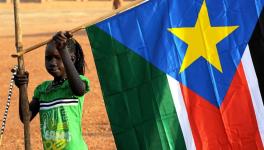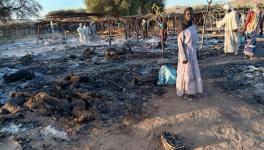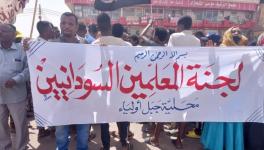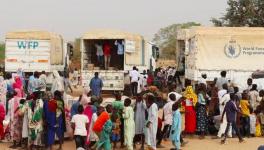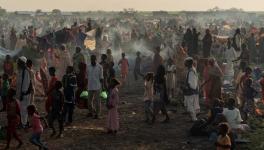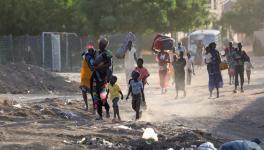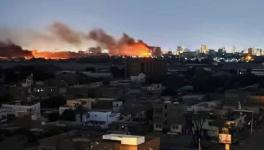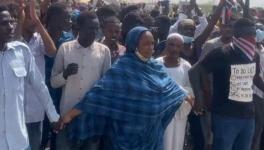In Sudan, Demands for Justice and Accountability Remain Unmet
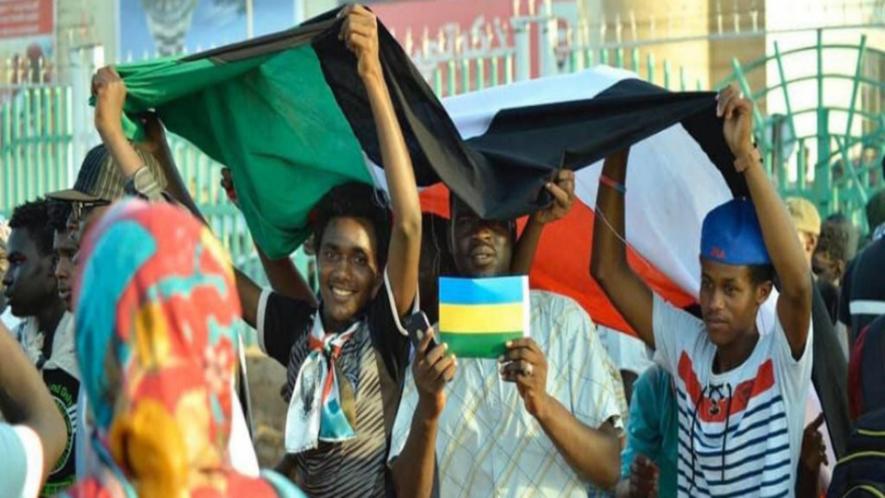
It’s been over two months since a transitional political arrangement was implemented in Sudan after months of protest. The country has a civilian prime minister and the civilian forces do have a say in government. However, for many, the demands for justice and accountability still have not been met. On October 21, tens of thousands of Sudanese took to the streets, calling on the newly formed transitional government to ban the ousted president Omar al-Bashir’s National Congress Party (NCP). The people are also demanding the trial of the perpetrators of the June 3 massacre.
The day marked the 55th anniversary of the mass uprising of 1964 that led to the fall of the country’s dictator, general Ibrahim Abboud, who had seized power in a military coup in 1958. The Sudanese Communist Party (SCP) had played a key role in organizing and leading the masses during that struggle, which eventually paved the way for democratic elections in the country.
The call for the rallies on the anniversary of Sudan’s ‘October revolution’ was given by the Sudanese Professionals Association (SPA). The SPA is a coalition of trade unions and professionals’ associations, which, with the backing of the SCP, spearheaded the December uprising in 2018 against the then president Omar al-Bashir.
Bashir had usurped supreme power through a coup in 1989. Soon after becoming president, he banned all unions in the country. The Sharia law instituted by him was selectively used to target political opponents. Imprisonment without trial and the torture of dissidents by the security services marked his rule.
The International Criminal Court (ICC) has since convicted Bashir of being guilty of committing genocide, war crimes and crimes against humanity. He oversaw a campaign of mass killings, abduction and rape of civilians in the Darfur region, where a civil war has been raging on for almost two decades.
All this brutal repression failed to deter the people, who rose in protest last December, initially against the tripling of prices of bread. The protests soon snowballed a mass uprising determined to overthrow Bashir’s regime.
Mass arrests, shooting of unarmed demonstrators and even of doctors who were found to be treating protesters injured by bullets followed over the next few months, claiming over 100 lives, as Bashir desperately sought to maintain his hold on power. However, the size of the demonstrations only grew. On April 6, hundreds of thousands of people marched to the army HQ and occupied the surrounding roads. The protesters then began a sit-in demonstration, demanding that Bashir be removed from power.
A considerable section among the junior ranks of the army was also sympathetic towards the people’s cause. This was evident when a number of soldiers fired back at the agents of the National Intelligence Security Services (NISS) who had begun shooting to clear the sit-in demonstration.
Finally, on April 11, the army moved to remove Bashir from power and put him under arrest. However, the protesters refused to clear the sit-in demonstration. They virtually laid siege to the army HQ, demanding that the military junta that had assumed power after removing Bashir make way for a civilian government.
This government was to be appointed by the Declaration of Freedom and Change Forces (DFCF). The DFCF is a broad coalition of political parties on the left and the center, which had come together along with the SPA to represent the protest movement and were signatories to the Declaration of Freedom and Change.
To be comprised of people with expertise in various fields, this government was to rule for a transitional period before holding elections.
The Declaration
Numerous tasks were set out for the transitional government in the Declaration of Freedom and Change, including the re-organizing of the economy to resolve the crisis there. In addition, negotiating with the armed rebels to bring an end to the civil war, and re-aligning Sudan’s foreign policy to serve the interests of the masses rather than the military elite, were part of the transitional government’s mandate. Sudan is offering support, for example, to the US-backed and Saudi-led coalition that is bombing Yemen, which in no way serves the interests of the common people.
On the ground, the force backing these demands were the protesters who held their positions at the sit-in demonstration. At any time of the day or night, tens of thousands remained at the site – chanting slogans and singing revolutionary songs. With systematically set up checkpoints and barricades, the protesters were ensuring that no state security agents or armed provocateurs could enter the demonstration.
However, the ruling military junta, which called itself the Transitional Military Council (TMC), was deeply entrenched in the system the Sudanese sought to change and had a high stake in maintaining the status quo. Thus, a number of attempts were made by the army to forcibly clear the demonstration.
While negotiations between the TMC and the DFCF were ongoing, the frequency of attacks on the protesters by militias and state security forces loyal to the regime increased. The need to break up the demonstration was strongly felt by the junta in order to gain an upper hand in the negotiations.
By then, however, another front had opened up in the struggle against military rule. Outside of the sit-in demonstration, the SPA rapidly expanded its base among the professionals and workers in various primary, secondary and tertiary sector industries.
A two-day general strike paralyzed the country by the end of May. The demonstrators had held out against the numerous attacks for almost two months. Government bank employees, pilots working for 10 different airlines, bus and engine drivers, dock workers, state electricity workers, doctors, pharmacists – all downed tools and demonstrated outside of their office premises, bringing public transport, banks, ports, airlines and other services to a halt.
Attempts made to arrest the striking employees and force them back to work did little to alleviate the impact of the country-wide strike action. While the junta became increasingly desperate, it was aware of the risk involved in ordering the army to launch an offensive to clear the demonstration. Such a move could have led to a split in the armed forces, a considerable section of which was still sympathetic to the struggle of the protesters.
That is when the military junta turned to the Rapid Support Forces (RSF) – a notorious militia of janjaweed fighters used by Bashir’s regime to commit genocide in Darfur. The infamous warlord, general Mohamed Hamdan Dagalo, who was also the vice-president of the military junta, heads this militia which is not a part of Sudan’s official armed forces.
The Massacre
On June 3, heavily armed militiamen blocked the various entrance and exit routes of the sit-in demonstration at the army HQ with armored vehicles and jeeps, and opened multiple rounds of machine gun fire on the protesters. Those who managed to escape were pursued and beaten – many of them to death – by men dressed in police uniform, but suspected to be from the RSF. Hundreds of women and young boys were raped, as the army stood back and watched the massacre.
At least 60 were thought to have been killed until June 5, when 40 more corpses floating in the Nile were recovered. Many of these bodies had been hacked with machetes and dumped into the river with heavy stones tied to their feet.
A reign of terror followed for over a week after this massacre, as the militia attempted to clear the demonstrators. Armed RSF troops had taken control of the streets of the capital city of Khartoum, beating, shooting and raping anyone who dared to set out of their houses. While some youngsters resorted to ‘barricade and run’ tactics, most of the city’s population was confined to virtual house arrest. The junta called off the negotiations with the DFCF, and blocked internet services in the country.
However, despite the RSF’s control of the streets, the SPA re-organized for a ‘total civil disobedience’ campaign, setting up committees in all neighborhoods, each tasked with different responsibilities, such as “ensuring the presence of food and drinking sources for the residents of the neighborhood, especially the elderly, the children and the needy” and the “relocation of emergency patients to hospitals in coordination with the sub-medical committees.” Information was spread across neighborhoods to raise awareness about the political situation in the country and explain the goals of the civil disobedience.
With the internet blockade still in place, most communication happened through SMS and hand-written notes. As a part of this disobedience campaign, a political strike was launched, yet again paralyzing the state machinery. Two weeks after the massacre, tens of thousands returned to the streets in large demonstrations, in defiance of the RSF, whose militiamen were overwhelmed by the numbers.
Eventually, the military junta was forced to restart the negotiations. By that time, however, two factions had emerged in the DFCF. The SCP and the parties of the Baathists and the Arab nationalists refused to enter into any agreement which compromised the goals set out in the Declaration and stopped short of a complete transfer of power to civilian authorities.
The centrist Sudanese Congress Party (SCoP) and the National Umma Party (NUP) – whose leader Sadiq al-Mahdi was toppled as the head of the state in the 1989 coup – were willing to accommodate the military junta in a power sharing arrangement.
After another round of arduous negotiations, a deal was finally concluded on July 5. As per this agreement, the country was to be ruled by a civilian-dominated transitional government – in which the military junta would also share power – for a period of 39 months, after which general elections were to be held.
A compromised agreement
It was agreed that the transitional government would be constituted of three bodies, the highest of which would be the sovereignty council headed by the country’s president. The president would be a military general for the first 21 months and a DFCF-appointed civilian for the remaining 18 months.
Accordingly, after further negotiations about the details of the agreement, the head of the military junta, Lt. Gen. Abdel Fattah Abdelrahman Burhan, took over as the president of the country on August 21. General Dagalo, the head of RSF, was made a member of the 11-member sovereignty council, which included five military generals, five DFCF-appointed civilians, and one civilian with a military background acceptable to both sides.
The second body of the transitional government is the cabinet, which was formed on September 6. Nominations for the ministers of this body were made by the DFCF, and finalized by Abdallah Hamdok, whom the DFCF chose as the prime minister. However, the defense and interior ministers were selected by the military council and the police forces, respectively. Hamdok was officially appointed to office by the sovereignty council, which was established on August 20.
The third body, the legislative council, is to be formed within three months of the establishment of the sovereignty council. Therefore, as per schedule, the council should be formed before November 20.
While the establishment of the transitional government has eased prevailing tensions and averted the possibility of further violence, the military’s share of power within it has diminished the possibility of achieving the goals of the revolution as set out in the Declaration.
Furthermore, the ability of this government to fulfill one of the most pressing demands of the mass of protesters – which is the prosecution of those responsible for the June 3 massacre – is severely compromised.
The struggle continues
On October 21, tens of thousands again took over the streets chanting “blood for blood, we do not accept blood money” and “the people want to take revenge for the martyrs.” Mass protests were registered in the Khartoum State, the cities of El Obeid, Wad madani, Atbara and numerous other areas.
While the protesters have made it clear that they will not accept any compromise on the demand for prosecution of the perpetrators of the June 3 massacre, the government is tied up by the fact that the agreement on the transitional government has also accorded immunity to the members of the sovereignty council, which includes the accused members of the military junta.
This immunity can only be lifted by the legislative council, which is yet to be formed. 67% of the members of this council will be appointed by the DFCF and the remaining seats will be shared by the other parties that are not a part of the DFCF, however, excluding the ousted president’s NCP and other Islamist parties who were in the ruling coalition.
The SPA is demanding that this body be formed soon in order to reduce the authority currently concentrated in the sovereignty council. However, the transitional government has stated that this body will not be formed until peace is established.
Nevertheless, some progress has been made in this direction. On the same date, October 21, delegates representing the Sudan Revolutionary Front (SRF) – an alliance of multiple armed movements – met in South Sudan with a delegation from the transitional government, which included general Dagalo.
An agreement over the cessation of hostilities was signed by the two parties, making way for the government to access rebel-controlled areas to provide humanitarian assistance. They have also agreed to carry forward talks to resolve the armed conflicts in the region of Darfur and Two states.
The SCP, which had played a crucial role in the agitation that brought down Bashir, has confirmed that it will not participate in the government. The party seeks to use its base to mobilize the masses to exert pressure on the government to end the civil war and remove “all traces of the regime’s symbols and institutions, the first of which is the security apparatus, and.. all forms of militarization that we consider to be a distortion of the civil state and a challenge to its democracy”.
The party has also demanded the formation of special courts “to try rape cases under regional and international monitoring”, along with “immediate retribution” for the June 3rd massacre.
Get the latest reports & analysis with people's perspective on Protests, movements & deep analytical videos, discussions of the current affairs in your Telegram app. Subscribe to NewsClick's Telegram channel & get Real-Time updates on stories, as they get published on our website.









